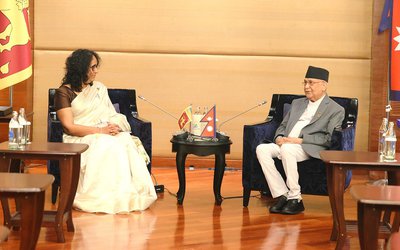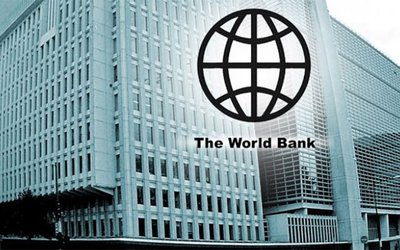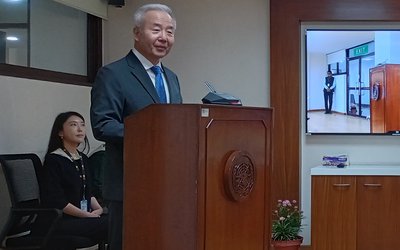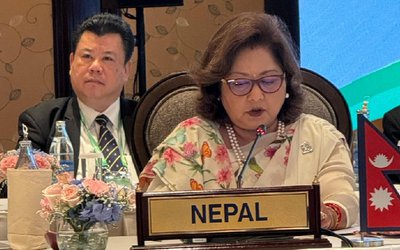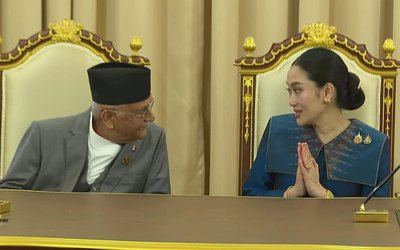
Nepal Rastra Bank has released the results of the expected inflation survey for the first quarter of the financial year 2079/80 (year 2022/23). This survey was conducted from October 23, 2079 to October 29 (October 9 to October 15, 2022) through interviews with people from 60 market areas in 57 cities. The results presented are based on the responses of 2040 people.
Compared to the previous survey, 899 more people have been added to this survey. Highlights 86.6 percent of the respondents expected price increase in the next three months. Similarly, 95.7 percent of the respondents expected price increase in the next one year.
The share of respondents who expect price increase in the next three months has decreased compared to June, 2079 and the share of respondents who expect price increase in the next one year has slightly increased.
Food and all sub-groups of food items; Non-food goods and services and all sub-groups; And in the real estate (housing) group, the percentage of respondents who expect the price to increase in the next three months seems to have decreased compared to June, 2022. The percentage of respondents who expect prices to increase one year ahead in food and food groups, pulses, sugar and spices and other groups and sub-groups except non-food and service group has slightly decreased compared to June, 2022. Expected inflation forecast between three months later and one year later has decreased compared to June 2022. Expected inflation between three months and one year later is 10 percent and 12.0 percent respectively.
Individuals expect inflation to fall in the near term and in the medium term. After Nepal Rastra Bank adopted a strict policy, it seems that the expected inflation has started to decrease.
Price Increase
Inflation is a measure of how expensive a unit of goods and services has become over a period of time, usually a year.
It is one of the most familiar terms in economics. Inflation plunges countries into long-term instability. Politicians win elections by promising to fight inflation, only to lose power when they fail to do so.
When buying and selling is decreasing due to lack of investable capital with banks and financial institutions, the general public expects the price of real estate and housing to decrease.
In the first quarter inflation (inflation) survey of the current financial year 2079/80 conducted by Nepal Rastra Bank, it has been seen that the number of people predicting that the price of real estate and housing will decrease within the next one year has increased.
Also, due to the lack of liquidity seen in banks and financial institutions, real estate transactions are decreasing due to non-classification of land by the local level as per Land Use Regulations 2079. Due to this, the general public has predicted that the prices will decrease in the coming days. According to Nepal Rastra Bank, the current survey indicates the consumer's expectations and the prices are affected by it. In the report of Nepal Rastra Bank, the price increase rate in October 2022 is 8.5 percent.
Consumers said that they felt the price increase rate was 14 percent during this period. Experts say that when the country is dependent on imported goods, inflation is also imported, which directly affects the daily life of the people. And, the issues experts worry about the most are unemployment and inflation—which none of the political parties have taken seriously.
It is clear that the people have to suffer when the government shows its presence and does not care about the suffering of the people. None of the political parties are serious about addressing the growing unemployment and rising inflation in the country, nor have they made any commitment to address the suffering of the people.
This is very unfortunate for the people and the country. In 2023, increasing remittance flows and increasing number of tourists will make Nepal likely to face global inflation caused by higher fuel prices and interest rate hikes by the United States Federal Reserve, an industry expert said.
The Central Bank of Nepal expects tourist arrivals to reach 2019 levels in 2023, which is expected to boost foreign exchange reserves. People have a desire to travel again, and Nepal has some unique attractions. Tourism contributes 15 percent to Nepal's gross domestic product, Nepal is a well-run economy, and there is consistency in economic policy. As long as the government can maintain sound macroeconomic, fiscal and monetary policies, that type of economic stability exists. Since India and China are Nepal's biggest trading partners, there are those who believe that India's economic status is good, which is good for Nepal.
Nepal is also fortunate because it has a large number of foreign workers who provide remittances. Nepal has about 600,000 workers in Qatar and about 400,000 in the United Arab Emirates, and those economies are linked to oil and they are strong. In 2023 , it is sure to be a challenging year for many economies and consumers as the inflationary effects of high oil prices will be felt in all oil importing countries including Nepal.
Oil is priced in US dollars, and the US dollar is appreciating. Oil prices are also rising overall. The IMF stated that there will be price increase and uncertainty in the next few years and monetary policy should try to maintain price stability and economic policy should be aimed at reducing the cost of living.
However, it has been pointed out that these policies should not be too flexible. The Government of Nepal has set a target of 8 percent economic growth through the budget of the current financial year. According to the "World Economic Outlook" released by the International Monetary Fund, Nepal's economy is projected to grow by 5 percent in the next financial year and 5.3 percent in the next financial year.
In the Nepalese market, the price has increased exponentially. From the beginning of the current financial year, it seems that inflation has gone beyond the control of the government.
It is estimated that the budget of the current financial year will be limited to 7 percent, since the first month of the financial year, the increase has been higher than the projected limit. It is certain that the market will become more chaotic even after the end of the festivals due to the elections of the House of Representatives and the State Assembly and the common man will have to bear the brunt of the price hike.
Double price increase in Nepal at once is a matter of concern in itself. Although inflation is a natural process, unnatural growth is not justified in any sense. The events of other countries have also shown the fact that if the inflation continues to rise, it can lead to a situation of rebellion in the society.
Due to the unnatural increase in prices, the common citizens get into a state of rebellion when they see difficulties in their daily living. In order to prevent this kind of uncomfortable situation from happening, the market should be kept healthy and balanced and it should be prevented from rapid price increase.
It is not an exaggeration to say that the prices have increased in Nepal, which is an imported economy, due to the problems of the supply system created around the world due to the war between Russia and Ukraine and the decrease in production in Nepal itself.
Price hikes affect the entire supply chain and will increase overall consumer price inflation and reduce purchasing power, making it harder for poor people to afford their food. Even if we look at it in the context of Nepal, since 2046 B.S. and even from the recent governments, every year the Minister of Finance has promised not to increase the price of essential commodities and to keep them under control, but it does not seem to be implemented in practice. Although economists are aware of the negative consequences of the high rate of price increase, if it cannot be stopped, the rate of inflation has been increasing rapidly in the past years. Some scholarly writers point out that there is a parallel between looters and inflation. The main difference between the two is that robbers are visible while inflation is invisible. If one or a few people suffer from robberies, the whole nation suffers from inflation. Robbers have to stand in court but inflation is legal. Development is not possible without the involvement of poor people. It is imperative to use the productive capacity of the poor people optimally to advance development efforts. It is the women class who are persecuted by everyone due to the vicious cycle of poverty. Because women are the poorest. Whenever the economic situation worsens, then a large number of men have to leave the country for work. Women, who are important food producers and income earners, bear the deepest responsibility for the advancement of their families and societies. Therefore, the problem of poverty cannot be seen separately from the gender problem.
The signs of improvement in Nepal's economy were already feared to be down trending. Although the economy is under pressure compared to the previous financial year, the economy has shown some positive signs of improvement in the last three months.
In the previous fiscal year, the economy was not only in a negative state, but also shrinking, according to the data released by Nepal Rastra Bank, the economy is improving. At the beginning of last year, there was great pressure in the external sector. In addition to the large contraction in foreign exchange reserves, there has also been a decrease in remittances. The balance of payments was also in huge deficit. However, now that situation is decreasing.
Even though the inflation has increased compared to the last financial year, but it has decreased compared to the last month, it is a challenge for the country and the people living in the country to expect an increase in inflation.
- “Kolahalko Kolaj “: A Collection Of Scattered Memories By Prakash Sayami
- Apr 02, 2025
- Nepal-India Trade, Transit And Unauthorized Trade: Some Considerations
- Jan 16, 2025
- PM Oli’s Forthcoming Visit To China: Will The Achievement Be Complete?
- Nov 29, 2024
- Obituary To Dr. Mohan Man Sainju!
- Nov 02, 2024
- Donations To Political Parties: Some Reflections
- Oct 24, 2024







